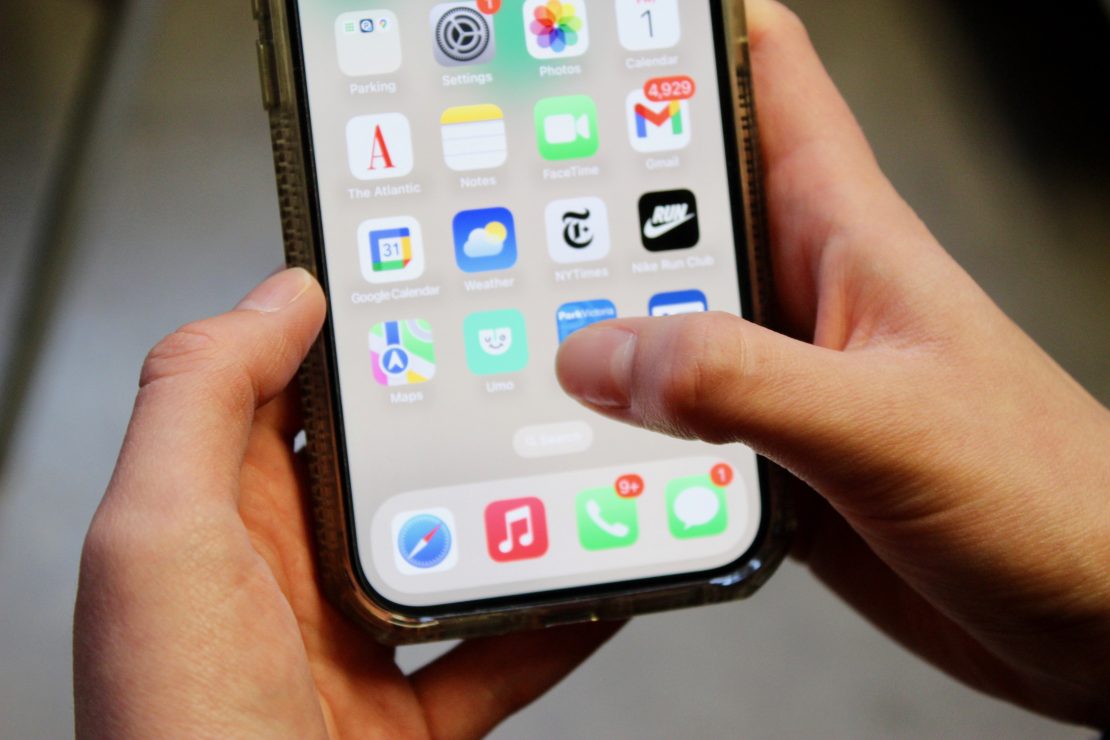Apps like Umo offer a restrictive illusion of freedom

Photo by Rae Dawson.
When Apple coined their slogan “there’s an app for that” in 2009 as part of an ad campaign, they promised to revolutionize the way we interact with the world. Any task we could think of could be done through a smartphone — the sheer possibilities were endless.
The ads worked. Although I didn’t get my first mobile phone until a few years later, I can still remember the elation I felt when I first started it up — unlimited potential right at my fingertips.
Like many kids getting their first phones, I spent feverish hours customizing every aspect of my mobile experience — decking my phone out with a fresh wallpaper, assigning individual ringtones to my friends, and, yes, downloading every app that piqued my interest.
Fast forward more than a decade, and, though smartphone technology has only become more sophisticated, our attitudes towards it have changed. Awareness about the pitfalls of excessive phone use seems to be growing, and in the last few years, a number of innovations, like the “dumbphone” — cell phones deliberately designed to be functional and non-addictive — as well as apps designed to curb phone use, like “minimalist phone,” have emerged to cater to a growing market of consumers who want less of their phones, not more.
Nevertheless, we still use our phones for just about everything. While social media still makes up most of our phone use, and is a major factor behind people’s desire to unplug, it’s not the only one. Phone use has become ubiquitous in our day to day life — from banking to public transit, we can do almost everything we need to do through our phones.
We’ve assumed that everyone has, and wants to have, a smartphone. In doing so, we’ve made a terrible mistake.
Take Umo, the payment system launched by BC Transit in August 2023. I was initially relieved to learn that I could get a physical Umo card, rather than being forced to use the mobile app. I just didn’t want another thing I had to use my phone for.
That enthusiasm waned, however, when I learned that Umo users were locked into using either the app or the physical card — not both. This seemed a baffling decision which could only inconvenience users. Someone who opted for the mobile app — the “recommended fare product” by BC Transit — would be unable to use the pre-paid pass if their phone was lost, stolen, broken, or dead.
Other transit systems have shown they are perfectly capable of functioning without relying on mobile apps. The system used by Translink in Vancouver, for example, doesn’t have an app — instead, Compass cards can be purchased from machines at most major transit hubs, like ferry terminals and SkyTrain stations. This ensures that everyone can use the transit system conveniently and equally.
For most of these services, like Umo, the tradeoff we make is one of convenience. I could still conceivably ditch my phone and continue using BC Transit more or less as normal. Granted, I would miss certain information, like cancelled rides or the real-time location of my bus, but I could manage my daily commutes just fine.
Companies like Ticketmaster, however, practically require users to have a smartphone. According to their website, a number of delivery methods are available for tickets, including Mobile Entry (where the ticket is scanned from your smartphone) to Print-At-Home.
However, not all events allow you a choice of delivery method. At every concert I’ve attended in the past year, I was not given a choice — Mobile Entry was the default and only option. This is a minor frustration for me, as someone who has a smartphone. For someone who doesn’t, either by choice or due to the cost of owning a phone, they would be completely without recourse.
While going to concerts and sports games is obviously not a necessity for life, they are a favourite pastime for many, and there’s no reason they should only be accessible to people who have a smartphone.
In too many areas of life, we have assumed smartphone ownership to be the default state for people. Not only do we assume that people have smartphones, we assume that they want to have them. In reality, not everyone wants to live this way, but by constructing so much of our soft infrastructure as if they do, we deny people the most basic freedom — choice.







